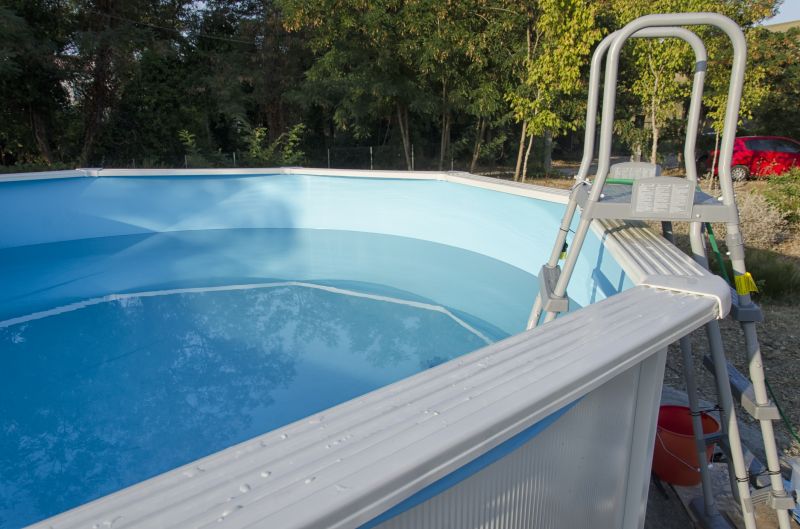Leading Products For Above Ground Pool Leak Repair And Maintenance
Identify effective products that help seal leaks and maintain your pool’s integrity with ease.
 Maintaining the integrity of an above ground pool often involves addressing minor damages and wear over time. Common issues include small leaks, tears in the liner, and damaged seams, which can compromise the pool's structure and water retention. Fortunately, there are numerous products designed to facilitate effective repairs, allowing pool owners to extend the lifespan of their investment without the need for costly replacements.
Maintaining the integrity of an above ground pool often involves addressing minor damages and wear over time. Common issues include small leaks, tears in the liner, and damaged seams, which can compromise the pool's structure and water retention. Fortunately, there are numerous products designed to facilitate effective repairs, allowing pool owners to extend the lifespan of their investment without the need for costly replacements.
Top Overall Option
All-Purpose Pool Repair Kit
An all-purpose pool repair kit typically includes a variety of patches, adhesives, and sealants designed to address multiple types of damage. These kits are versatile and user-friendly, making them suitable for both minor and moderate repairs. They often come with detailed instructions to help pool owners achieve durable results, facilitating quick fixes for leaks, tears, and seam issues. Such kits are a practical choice for maintaining above ground pools without the need for specialized tools or professional assistance.
Types of Products For Above Ground Pool Repairs
Patch Kits for Small Tears
Pre-cut patches and adhesive designed specifically for quick repairs of minor punctures and tears in pool liners.
Liquid Pool Sealants
Flexible sealants that can be applied around fittings, seams, or cracks to provide a waterproof barrier.
Pool Liner Replacement Sections
Pre-cut liner panels or full replacement liners for addressing extensive damage or aging pool surfaces.
Epoxy and Waterproof Glue
Strong adhesives suitable for bonding pool components or repairing structural cracks in plastic or PVC parts.
Seam Tape and Reinforcements
Reinforcement tapes designed to strengthen seams or cover larger repair areas in pool liners.
Leak Detection Dyes
Dyes that help locate leaks in the pool structure or plumbing connections for targeted repairs.
Fittings and Replacement Parts
Replacement fittings, valves, and connectors to repair or upgrade pool plumbing components.
Patch Repair Kits for Pool Walls
Specialized kits for repairing minor damage to the pool’s wall material, often including patches and adhesives.
Waterproof Tape
Self-adhesive tape used to temporarily or permanently seal leaks in various pool parts.
Chemical Sealants
Chemical-based sealants that react to form a durable, waterproof bond over cracks and leaks.
Popular Choices
Versatile kits combining patches and sealants suitable for addressing different types of damages on pool surfaces.
Liquid sealants that remain flexible after curing, ideal for sealing leaks around fittings and seams.
Pre-cut patches with adhesive designed specifically for repairing tears in pool liners.
Epoxy adhesives formulated for bonding PVC parts and sealing cracks in pool components.
Dyes and tools to help locate leaks precisely, facilitating targeted repairs.
Strong tapes that reinforce repairs on liners and walls, providing added durability.
Essential for repairing or replacing damaged fittings and connectors in the pool's plumbing system.
Spray-on sealants for quick application over leaks and cracks.
Quick-acting sealers for temporary fixes until a more permanent repair can be made.
Patches designed for minor wall damage, easy to apply for quick repairs.
Chemical formulations that react with water or air to form a waterproof seal over cracks.
Putty that molds easily to fill cracks and holes in various pool parts.
Repair products for above ground pools vary widely, from simple patch kits to more advanced sealants and liners. Patch kits typically include adhesive and patches that can be applied directly over small tears or holes, making them suitable for quick fixes. Sealants, often in liquid or spray form, can be used to seal leaks around fittings, seams, or cracks, providing a flexible and durable barrier. For larger or more complex damages, replacement liners or sections may be necessary, offering a more comprehensive solution.
Choosing the right repair product depends on the type and extent of damage, as well as the material of the pool. Compatibility with the existing pool surface ensures that repairs are effective and long-lasting. Proper application is crucial; following manufacturer instructions carefully will help achieve the best results. Regular inspection and maintenance can prevent minor issues from escalating, saving time and money in the long run.
Investing in quality repair products can help pool owners maintain a safe and enjoyable swimming environment. Whether addressing small punctures or larger tears, understanding the different options available and selecting appropriate solutions can make repairs more manageable. With the right products and techniques, above ground pools can be effectively restored, allowing continued enjoyment during the swimming season.
Key Buying Considerations
- Type and extent of damage to determine appropriate repair products.
- Compatibility of repair materials with existing pool liner or wall material.
- Ease of application, especially for DIY repairs.
- Durability and flexibility of the repair solution under water and temperature fluctuations.
- Size of the damaged area to select the correct patch or sealant dimensions.
- Curing time required for the product to set and achieve effective sealing.
- Water resistance and waterproofing capabilities of the repair product.
- Availability of replacement parts or additional accessories needed for repair.
- User reviews and product ratings to gauge effectiveness and ease of use.
- Cost and value considering the type of damage and repair longevity.
- Compatibility with pool chemicals to avoid adverse reactions.
- Shelf life and storage requirements of repair products.
- Professional recommendations or instructions for complex repairs.
- Environmental conditions where the pool is located, such as exposure to sunlight or chemicals.
- Frequency of repairs needed based on pool usage and age.
